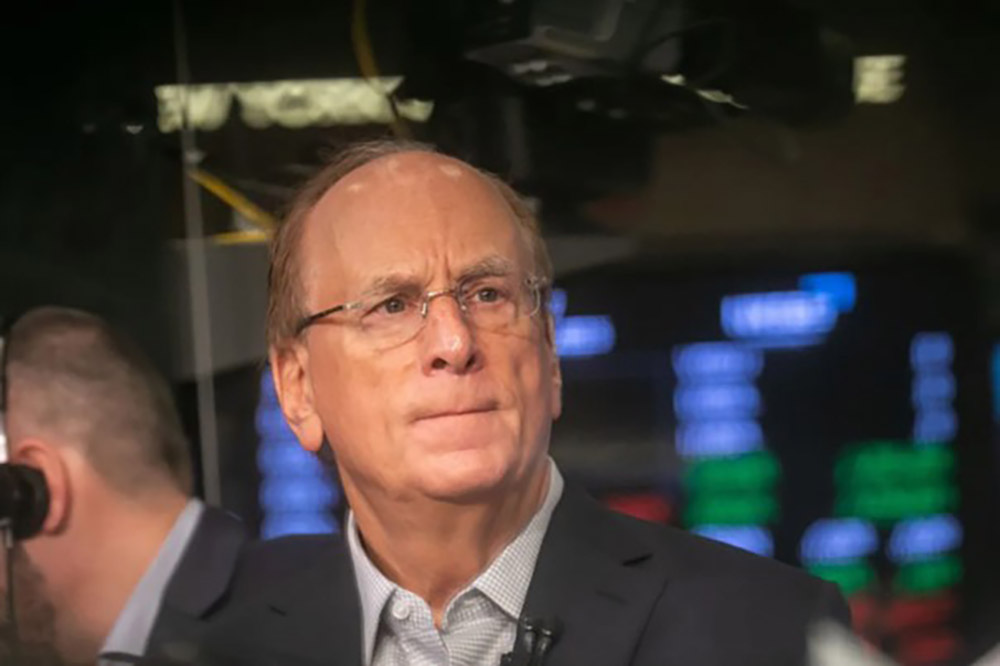
投資巨頭貝萊德(BlackRock,,管理規(guī)模達(dá)11.6萬億美元)首席執(zhí)行官拉里·芬克素以逆向投資著稱,。過去一年飽受非議的英國經(jīng)濟(jì),,或許會成為他的最新投資標(biāo)的,。
芬克表示,,基于對英國工黨政府“促增長”議程的信心,,貝萊德正“全面”加碼英國資產(chǎn)配置,并補(bǔ)充稱,,英國和歐洲在觸及“投降點(diǎn)”后,,正進(jìn)入反彈期。
這位72歲的貝萊德集團(tuán)掌舵人捕捉到英國的投資機(jī)遇,,提及國民西敏寺銀行(NatWest),、勞埃德銀行(Lloyds)及圣詹姆斯廣場(St. James’s Place)等金融股,認(rèn)為這些股票因市場負(fù)面情緒而遭到低估,,在他看來,,此類負(fù)面情緒“可能缺乏事實(shí)依據(jù)”。
在接受《泰晤士報(bào)》采訪時(shí),,芬克以數(shù)項(xiàng)公眾行為轉(zhuǎn)變?yōu)槔?,表明他對英國發(fā)掘新增長機(jī)遇充滿信心,并認(rèn)為基爾·斯塔默(Keir Starmer)領(lǐng)導(dǎo)的政府專注于解決“棘手問題”,。
他坦言:“英國與歐洲本就具備諸多根本性優(yōu)勢,,卻長期受到過度監(jiān)管和過多管控的束縛,這讓我深有感觸,。在我看來,,當(dāng)時(shí)的情況已觸及投降點(diǎn)?!?/p>
芬克對英國經(jīng)濟(jì)的樂觀判斷,,與大眾認(rèn)知大相徑庭。大眾普遍認(rèn)為英國經(jīng)濟(jì)增長滯后,,即將陷入衰退,,高凈值人群也即將大批外流。
企業(yè)對新出臺的國民保險(xiǎn)繳納義務(wù)及靈活工作政策頗有微詞,,稱這些政策加大了招聘和企業(yè)發(fā)展的難度,。與此同時(shí),有報(bào)道稱,,受非居民稅收法規(guī)調(diào)整影響,,億萬富翁群體正大規(guī)模撤離英國。房地產(chǎn)投資領(lǐng)域的億萬富翁兄弟伊恩·利文斯通(Ian Livingstone)和理查德·利文斯通(Richard Livingstone)成為最新的離英者,,自去年5月大選以來,,已有數(shù)千人離開英國。
英國本就緊張的公共財(cái)政,,還面臨著唐納德·特朗普政府威脅實(shí)施大規(guī)模報(bào)復(fù)性關(guān)稅帶來的壓力,,這將嚴(yán)重影響英國經(jīng)濟(jì)增長。
這些壓力似乎正在主導(dǎo)英國民眾的情緒,。
益普索·莫里(Ipsos MORI)的一項(xiàng)民意調(diào)查顯示,,75%的英國民眾預(yù)計(jì)未來12個(gè)月經(jīng)濟(jì)形勢將持續(xù)惡化,,刷新了該調(diào)查自1978年啟動(dòng)以來的悲觀情緒紀(jì)錄。該機(jī)構(gòu)發(fā)布的經(jīng)濟(jì)樂觀指數(shù)為-68,,較2022年生活成本危機(jī)期間,、2008年全球金融危機(jī)期間以及1980年全球經(jīng)濟(jì)衰退初期記錄的數(shù)據(jù)更為嚴(yán)峻。
這種悲觀情緒在企業(yè)界同樣蔓延開來,,企業(yè)紛紛未雨綢繆,,為可能因關(guān)稅戰(zhàn)引發(fā)的經(jīng)濟(jì)衰退提前部署應(yīng)對策略。3月英國采購經(jīng)理指數(shù)跌至2022年以來的最低水平,,表明企業(yè)因信心不足而減少業(yè)務(wù)活動(dòng),。
然而,即便面對諸多負(fù)面信號,,相較于里?!ぬK納克(Rishi Sunak)首相任期最后數(shù)月時(shí)的黯淡論調(diào),芬克如今對英國經(jīng)濟(jì)的預(yù)期更為樂觀,。據(jù)彭博社去年披露,,英國財(cái)政大臣蕾切爾·里夫斯(Rachel Reeves)曾主動(dòng)向貝萊德等投資巨頭拋出橄欖枝,力邀其參與英國經(jīng)濟(jì)重建進(jìn)程,。
“相較一年前,,如今我對英國經(jīng)濟(jì)更有信心。"
芬克對辦公空間短缺表示失望
貝萊德進(jìn)軍英國可能會遇到的一大障礙是辦公空間短缺,。
芬克迫切希望將倫敦約3000名員工集中到一處辦公,,以加速該集團(tuán)在英國的布局進(jìn)程,。然而,,由于缺乏合適的辦公場所,他的計(jì)劃陷入僵局,。
芬克在接受《泰晤士報(bào)》采訪時(shí)表示:“隨著在倫敦的收購版圖不斷擴(kuò)張,,眼下我正深陷辦公空間嚴(yán)重短缺的困局。明日就急需一間辦公室,,可尋遍倫敦也難覓合適之所,。”
“倘若我能確定未來12個(gè)月內(nèi)可獲批啟動(dòng)建設(shè)項(xiàng)目,,我會自建辦公樓,。”(財(cái)富中文網(wǎng))
譯者:中慧言-王芳
投資巨頭貝萊德(BlackRock,,管理規(guī)模達(dá)11.6萬億美元)首席執(zhí)行官拉里·芬克素以逆向投資著稱,。過去一年飽受非議的英國經(jīng)濟(jì),或許會成為他的最新投資標(biāo)的,。
芬克表示,,基于對英國工黨政府“促增長”議程的信心,,貝萊德正“全面”加碼英國資產(chǎn)配置,并補(bǔ)充稱,,英國和歐洲在觸及“投降點(diǎn)”后,,正進(jìn)入反彈期。
這位72歲的貝萊德集團(tuán)掌舵人捕捉到英國的投資機(jī)遇,,提及國民西敏寺銀行(NatWest),、勞埃德銀行(Lloyds)及圣詹姆斯廣場(St. James’s Place)等金融股,認(rèn)為這些股票因市場負(fù)面情緒而遭到低估,,在他看來,,此類負(fù)面情緒“可能缺乏事實(shí)依據(jù)”。
在接受《泰晤士報(bào)》采訪時(shí),,芬克以數(shù)項(xiàng)公眾行為轉(zhuǎn)變?yōu)槔?,表明他對英國發(fā)掘新增長機(jī)遇充滿信心,并認(rèn)為基爾·斯塔默(Keir Starmer)領(lǐng)導(dǎo)的政府專注于解決“棘手問題”,。
他坦言:“英國與歐洲本就具備諸多根本性優(yōu)勢,,卻長期受到過度監(jiān)管和過多管控的束縛,這讓我深有感觸,。在我看來,,當(dāng)時(shí)的情況已觸及投降點(diǎn)?!?/p>
芬克對英國經(jīng)濟(jì)的樂觀判斷,,與大眾認(rèn)知大相徑庭。大眾普遍認(rèn)為英國經(jīng)濟(jì)增長滯后,,即將陷入衰退,,高凈值人群也即將大批外流。
企業(yè)對新出臺的國民保險(xiǎn)繳納義務(wù)及靈活工作政策頗有微詞,,稱這些政策加大了招聘和企業(yè)發(fā)展的難度,。與此同時(shí),有報(bào)道稱,,受非居民稅收法規(guī)調(diào)整影響,,億萬富翁群體正大規(guī)模撤離英國。房地產(chǎn)投資領(lǐng)域的億萬富翁兄弟伊恩·利文斯通(Ian Livingstone)和理查德·利文斯通(Richard Livingstone)成為最新的離英者,,自去年5月大選以來,,已有數(shù)千人離開英國。
英國本就緊張的公共財(cái)政,,還面臨著唐納德·特朗普政府威脅實(shí)施大規(guī)模報(bào)復(fù)性關(guān)稅帶來的壓力,,這將嚴(yán)重影響英國經(jīng)濟(jì)增長。
這些壓力似乎正在主導(dǎo)英國民眾的情緒。
益普索·莫里(Ipsos MORI)的一項(xiàng)民意調(diào)查顯示,,75%的英國民眾預(yù)計(jì)未來12個(gè)月經(jīng)濟(jì)形勢將持續(xù)惡化,,刷新了該調(diào)查自1978年啟動(dòng)以來的悲觀情緒紀(jì)錄。該機(jī)構(gòu)發(fā)布的經(jīng)濟(jì)樂觀指數(shù)為-68,,較2022年生活成本危機(jī)期間,、2008年全球金融危機(jī)期間以及1980年全球經(jīng)濟(jì)衰退初期記錄的數(shù)據(jù)更為嚴(yán)峻。
這種悲觀情緒在企業(yè)界同樣蔓延開來,,企業(yè)紛紛未雨綢繆,,為可能因關(guān)稅戰(zhàn)引發(fā)的經(jīng)濟(jì)衰退提前部署應(yīng)對策略。3月英國采購經(jīng)理指數(shù)跌至2022年以來的最低水平,,表明企業(yè)因信心不足而減少業(yè)務(wù)活動(dòng),。
然而,即便面對諸多負(fù)面信號,,相較于里?!ぬK納克(Rishi Sunak)首相任期最后數(shù)月時(shí)的黯淡論調(diào),芬克如今對英國經(jīng)濟(jì)的預(yù)期更為樂觀,。據(jù)彭博社去年披露,,英國財(cái)政大臣蕾切爾·里夫斯(Rachel Reeves)曾主動(dòng)向貝萊德等投資巨頭拋出橄欖枝,力邀其參與英國經(jīng)濟(jì)重建進(jìn)程,。
“相較一年前,,如今我對英國經(jīng)濟(jì)更有信心。"
芬克對辦公空間短缺表示失望
貝萊德進(jìn)軍英國可能會遇到的一大障礙是辦公空間短缺,。
芬克迫切希望將倫敦約3000名員工集中到一處辦公,,以加速該集團(tuán)在英國的布局進(jìn)程。然而,,由于缺乏合適的辦公場所,,他的計(jì)劃陷入僵局。
芬克在接受《泰晤士報(bào)》采訪時(shí)表示:“隨著在倫敦的收購版圖不斷擴(kuò)張,,眼下我正深陷辦公空間嚴(yán)重短缺的困局,。明日就急需一間辦公室,,可尋遍倫敦也難覓合適之所,。”
“倘若我能確定未來12個(gè)月內(nèi)可獲批啟動(dòng)建設(shè)項(xiàng)目,,我會自建辦公樓,。”(財(cái)富中文網(wǎng))
譯者:中慧言-王芳
Larry Fink, CEO of the $11.6 trillion investing titan BlackRock, is used to making contrarian bets. The entire U.K. economy, much maligned in the past year, could be his latest one.
Fink says BlackRock is investing in U.K. assets “across the board” after being reassured by the Labour government’s “pro-growth” agenda, adding that the U.K. and Europe are entering a rebound era after discovering their “capitulation point.”
The 72-year-old BlackRock boss has spied an investing opportunity in the U.K., name-checking finance stocks like NatWest, Lloyds, and St. James’s Place as equities that were undervalued by a level of negativity that Fink thinks “was probably not warranted.”
In his interview with the Times, Fink pointed to several examples of shifting public practices that gave him confidence in the U.K.’s ability to discover fresh growth opportunities and argued that Keir Starmer’s government was focused on “hard issues.”
“It just resonated with me—that there are so many fundamentally strong attributes about the U.K. and Europe, and they’ve been so smothered by overregulation, by too much control,” he said. “And to me, it was just very clear we were at a capitulation point.”
Fink’s positive ruminations on the U.K. economy are a divergence from popular opinion, which has painted the U.K. as a growth laggard on the cusp of both a recession and an exodus of its richest citizens.
Businesses have complained about new national insurance obligations and flexible working policies that they argue make it harder to hire and grow. Meanwhile, there are reports that billionaires are kick-starting a mass exodus from the country owing to changes in non-dom tax regulations. Billionaire real estate investing brothers Ian and Richard Livingstone were among the latest to exit the U.K., joining thousands of others since last May’s election.
The U.K. is also facing pressure on its already tight public finances from the Donald Trump administration’s threats of widespread retaliatory tariffs that would significantly affect growth.
These pressures appear to be driving the dominant sentiment among the U.K. public.
An Ipsos MORI poll revealed 75% of Brits expect the economy to get worse over the next 12 months, marking the gloomiest sentiment among the public since the survey was launched in 1978. The group’s Economic Optimism Index registered a -68, worse than results during the cost-of-living crisis in 2022, the Global Financial Crisis in 2008, and a global recession kick-starting in 1980.
That sentiment is similar among businesses, which are beginning to build their defenses ahead of a possible recession induced by the tariff war. The U.K.’s Purchasing Managers’ Index fell to its lowest level since 2022 in March, suggesting businesses are reducing activity owing to low confidence.
Despite this evidence to the contrary, however, Fink is cheerier on the U.K. than he was in the final months of Rishi Sunak’s premiership. Bloomberg reported last year that BlackRock was among the investment groups being wooed by Chancellor Rachel Reeves to help rebuild Britain.
“I have more confidence in the U.K. economy today than I did a year ago.”
Fink laments lack of space
One obstacle that might halt BlackRock’s march on the U.K. is office space.
Fink is keen to bring all of his approximately 3,000 London employees under one roof to expedite the group’s bet on the U.K. He’s being foiled, though, by a lack of available real estate.
“I am so short of space here in London with all our acquisitions. I need an office tomorrow, but there is nothing here,” Fink told the Times.
“If I knew I could put the shovel in the ground in the next 12 months, I’d build our own.”






